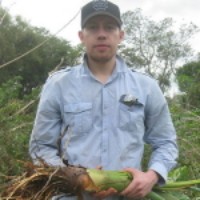Miguel Sioui

Associate Professor
Undergraduate officer (Environmental Studies)
Faculty of Science
Geography and Environmental Studies
Waterloo, Ontario
msioui@wlu.ca
Office:
(519) 884-0710 ext. 2609
Expert In
Languages
English
French
Spanish
French
Spanish
Bio/Research
As an Indigenous geographer and environmental management scholar deeply rooted in my Huron-Wendat traditions and community, I see my purpose as a cultural translator between two worlds – Western and Indigenous – that have historically struggled to meaningfully communicate. Indeed, for a variety o...
Click to Expand >>
Click to Expand >>
Bio/Research
As an Indigenous geographer and environmental management scholar deeply rooted in my Huron-Wendat traditions and community, I see my purpose as a cultural translator between two worlds – Western and Indigenous – that have historically struggled to meaningfully communicate. Indeed, for a variety of reasons, academia has traditionally been reluctant to seek to understand Indigenous ways of knowing, doing, and being, and to incorporate relevant Indigenous knowledge (IK) concepts into fields related to environmental management. I am keenly aware of the need for deeper reconciliation between the Indigenous and non-Indigenous intellectual communities through the creation of mutually usable channels of communication and research collaboration.
It is this deeper motivation that initially sparked my interest in the field of environmental studies and management. My growing interest in Indigenous environmental management paradigms compelled me to pursue my MA in geography at the University of Ottawa. My two-year participatory research in a 'non-status' Algonquin community in eastern Ontario (Ardoch Algonquin First Nation) project sought to understand AAFN’s traditional spiritual ecology (mino pimàdiziwin) as it is currently practiced by its members, and compare it with land-use ethics underlying resource development strategies promoted by the Ontario government. My master’s research further augmented my interest in Indigenous land-based philosophies, and led me to choose to pursue my doctoral research, at Carleton University, on current Mayan land-use and management knowledges in Yucatan, Mexico. Relying on interviews and participant-observation, my doctoral research sought to document, interpret and elaborate a synthesis of the current state of Yucatec Maya land-use knowledges of a Mayan community (Xuilub) and describe how they are understood and put into practice on the land by its members.
My current research aims to bridge Indigenous and Western academic epistemologies. I believe this harmonization process will foster the development of environmental management strategies that are more likely to promote responsible and respectful relationships with the environment over the long term. It is my hope that this effort will help the Canadian and global societies to deal more effectively with increasingly complex local, regional, and global environmental management challenges.
Click to Shrink <<
It is this deeper motivation that initially sparked my interest in the field of environmental studies and management. My growing interest in Indigenous environmental management paradigms compelled me to pursue my MA in geography at the University of Ottawa. My two-year participatory research in a 'non-status' Algonquin community in eastern Ontario (Ardoch Algonquin First Nation) project sought to understand AAFN’s traditional spiritual ecology (mino pimàdiziwin) as it is currently practiced by its members, and compare it with land-use ethics underlying resource development strategies promoted by the Ontario government. My master’s research further augmented my interest in Indigenous land-based philosophies, and led me to choose to pursue my doctoral research, at Carleton University, on current Mayan land-use and management knowledges in Yucatan, Mexico. Relying on interviews and participant-observation, my doctoral research sought to document, interpret and elaborate a synthesis of the current state of Yucatec Maya land-use knowledges of a Mayan community (Xuilub) and describe how they are understood and put into practice on the land by its members.
My current research aims to bridge Indigenous and Western academic epistemologies. I believe this harmonization process will foster the development of environmental management strategies that are more likely to promote responsible and respectful relationships with the environment over the long term. It is my hope that this effort will help the Canadian and global societies to deal more effectively with increasingly complex local, regional, and global environmental management challenges.
Click to Shrink <<
Media Relations
Aonghus Kealy
Communications and Media Relations Officer
akealy@wlu.ca
(548) 889-4855
Click to Expand >>
Communications and Media Relations Officer
akealy@wlu.ca
(548) 889-4855
Click to Expand >>
Media Relations
Aonghus Kealy
Communications and Media Relations Officer
akealy@wlu.ca
(548) 889-4855
Lori Chalmers Morrison
Director: Integrated Communications
lchalmersmorrison@wlu.ca
(548) 889-4857
Vanessa Barrasa
Director: Communications & Issues Management
vbarrasa@wlu.ca
(548) 889-3812
Brantford Campus:
Beth Gurney
Director, Strategic Communications and Community Engagement
bgurney@wlu.ca
(548) 889-4199
Click to Shrink <<
Communications and Media Relations Officer
akealy@wlu.ca
(548) 889-4855
Lori Chalmers Morrison
Director: Integrated Communications
lchalmersmorrison@wlu.ca
(548) 889-4857
Vanessa Barrasa
Director: Communications & Issues Management
vbarrasa@wlu.ca
(548) 889-3812
Brantford Campus:
Beth Gurney
Director, Strategic Communications and Community Engagement
bgurney@wlu.ca
(548) 889-4199
Click to Shrink <<